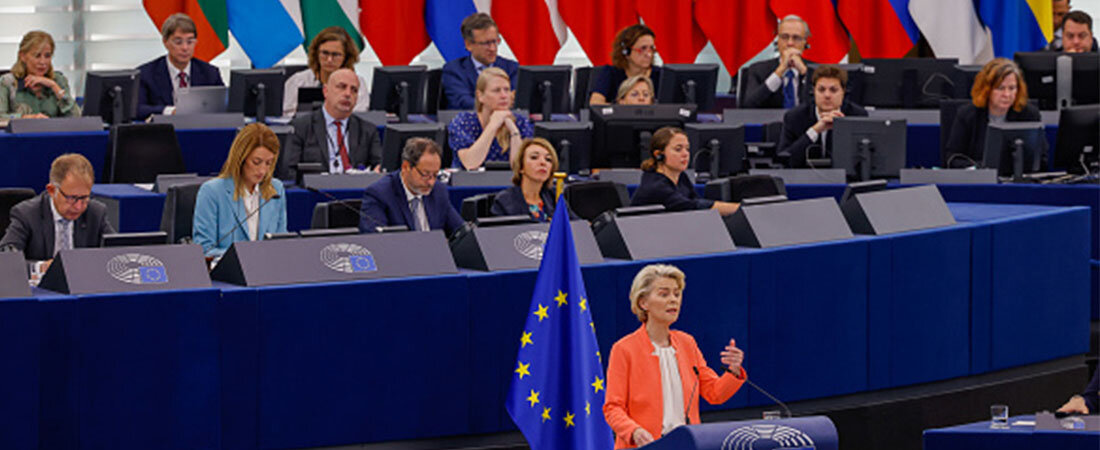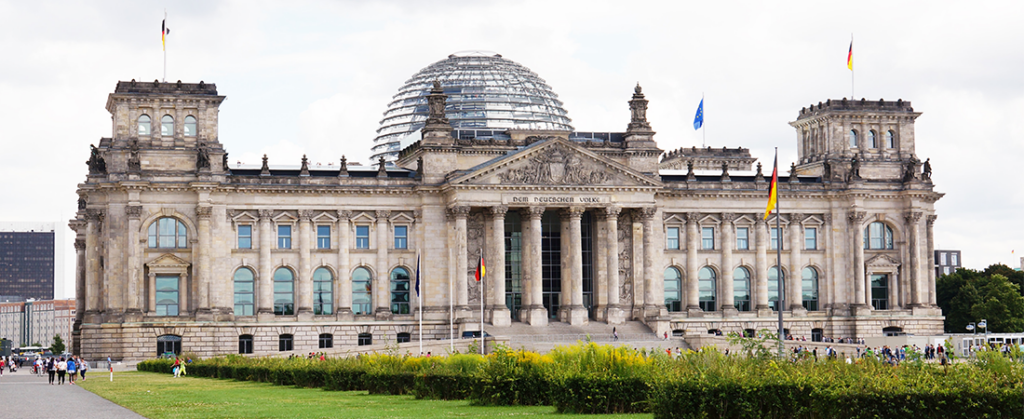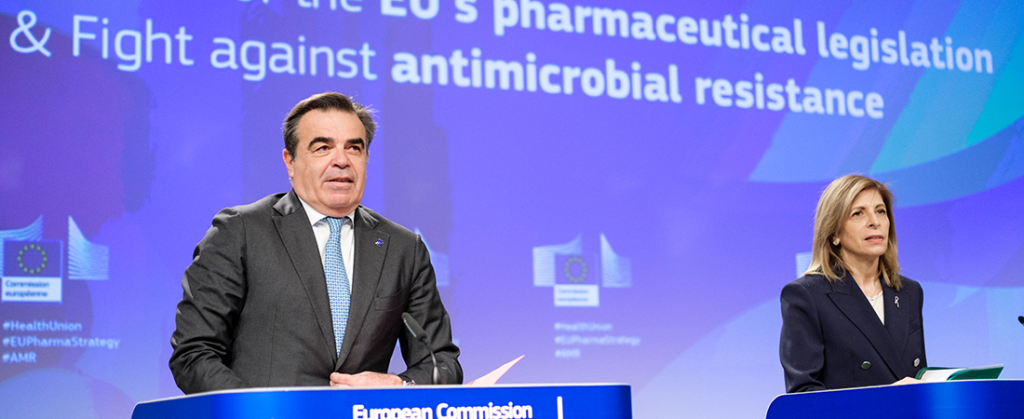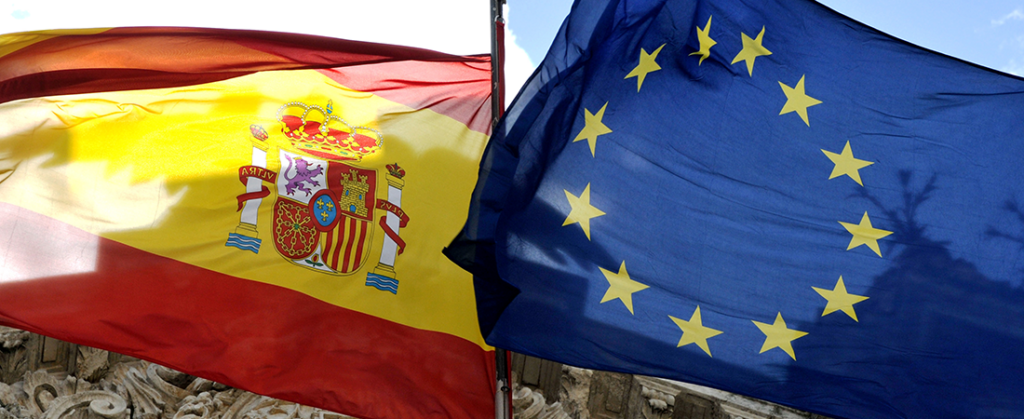On Wednesday, 13th September, European Commission President Ursula von der Leyen delivered her State of the European Union Speech (SOTEU) at a plenary session of the European Parliament in Strasbourg.
This yearly key intervention by the Commission President, which has grown in importance in Brussels, serves as a way not only to present the work that has been done in the past year(s), but also to set out the priorities for the year to come.
This year’s SOTEU is of particular importance, as it was the last one to take place before the next European Elections, which have been set for 6-9 June 2024. In fact, many consider yesterday’s speech to be a kick-off to von der Leyen’s re-election campaign for a second term as President of the Commission. With a solid track record at the helm of the Commission, she will now need to secure key political support from national capitals and the new European Parliament.
A group of our Portland Brussels policy experts provide below their key insights into the SOTEU, and what it means for various sectors for the year to come.
Tech
The President’s remarks covered specific aspects of tech and digital policy, focusing specifically on Europe’s leadership in the domain, on the need to adapt to key technological developments, and on strategic autonomy.
Understandably, a central pillar of the President’s remarks was artificial intelligence, given lightning-speed developments in generative AI over the past few months. Von der Leyen stressed that Europe should play a leading role in the development of a global framework on AI and called for the creation of a global expert group (similar to the IPCC for climate change) – a proposal that may ruffle feathers in the US, which has argued for a narrower definition of AI and more flexible exemptions. She also stated that the EU would work with companies to encourage voluntary compliance with the AI Act prior to its entry into force. Lastly, to encourage the responsible development of AI models, the Commission will work to open up its high-performance computers to AI start-ups.
The strategic importance of technology, and of its value chain, for Europe was also highlighted. Noting the problems caused by China’s export restrictions on gallium and germanium, key critical raw materials for semiconductors, the President emphasised the need to work with like-minded partners. In this spirit, the EU will launch the first meeting of the Critical Raw Materials Club this year.
Health
The COVID-19 pandemic has been a defining moment during Ursula Von der Leyen’s mandate at the helm of the European Commission, but you would be forgiven for not appreciating its magnitude following her address.
There were brief mentions of the EU’s COVID-19 vaccination efforts and the formation of the ‘building blocks’ for the EU Health Union but little else on health. This is surprising, given that the pandemic expanded the EU’s activity in health where there was previously little appetite to do so.
Von der Leyen omitted mentioning several key health policy milestones of her mandate such as the Europe Beating Cancer Plan, the creation of the Health Emergency Preparedness and Response Authority (HERA), and the recently published mental health strategy.
Perhaps this is a sign that health has had its day in the spotlight, and an indication of where it will sit amongst priorities if Von der Leyen were to throw her hat into the ring to lead the Commission again.
An alternative reading would be that the President deliberately avoided drawing attention to an area where initiatives touted as legacy-defining look to be on shaky ground – such as the proposed Pharma Package and European Health Data Space.
Sustainability
President von der Leyen stressed that the Green Deal is now the engine driving the European economy – but between the lines she acknowledged concerns over its implementation.
In what appeared to be a signal to conservative voices – including her own European People’s Party – von der Leyen outlined a push towards increased exchange with business in the coming months, notably in the area of clean technology. This will take the form of the Clean Transition Dialogues, which the Commission will use to discuss the adaptation of Europe’s industry and its decarbonisation.
A “strategic dialogue” is also what the Commission seeks to launch in order to work towards a more sustainable form of agriculture. In the language of politics, “dialogue” can often mean concessions and we may, potentially, see food security take precedence over sustainability and environmental issues, as advocated by many on the centre-right.
The recent shifts in the EU’s climate portfolio to known “dealmaker” Maroš Šefčovič and currently nominated Dutch conservative Wopke Hoekstra suggest that further efforts are underway to find more common ground with industry in the next term. With so many Green Deal and sustainability files on the table, and with the European Elections less than nine months away, a key question now is how many can be completed before that next mandate commences.
Mobility
While mobility was not a centrepiece of von der Leyen’s speech, it did constitute what can be considered this year’s “bombshell” announcement: an investigation into Chinese electric vehicles (EVs) and the subsidies they receive. Von der Leyen criticised the Chinese government for keeping the price of EVs artificially low, which is causing market distortion in the EU. According to the Commission President, the EU is open for competition, but not a race to the bottom.
The announcement marks a win for France, as Paris pushed hard for such a probe. Berlin, meanwhile, had expressed reservations because German carmakers have a much larger presence on the Chinese market and would keenly feel the effects of any retaliation from Beijing. The probe will likely be a major topic of discussion at the EU-China trade dialogue, which takes place on 25th September. China has already strongly criticised the announcement, calling it protectionist and stressing that it will protect the interest of Chinese companies.
EVs and batteries also got a mention from von der Leyen when she promised that all sectors will reap the benefits of the newly announced Clean Transition Dialogues, which will certainly require continued focus in the next term on how to improve the supply of critical raw materials essential for these products.
Energy
In her speech, Ursula von der Leyen also highlighted the European Union’s commitment to achieving energy independence and sustainability. Additionally, the EU has attracted significant investment in clean hydrogen, surpassing both the United States and China, underlining its dedication to clean energy technologies.
Recognising the current challenges faced by the wind energy sector, the EU plans to launch a European Wind Power Package, working closely with industry and Member States to streamline permitting, improve auction systems and enhance skills and supply chains.
The speech also celebrated the success of Europe’s energy policy in reducing energy prices while addressing concerns about energy security. Referring to Putin’s instrumentalization of energy in the Ukraine war, the Commission President emphasised how Europe’s unity in adopting emergency measures helped effectively tackle the crisis. By pooling demand and investing in renewables, Europe ensured a stable energy supply and significantly reduced gas prices. Von der Leyen highlighted the need to replicate this successful model in other critical sectors like clean hydrogen and raw materials.
The need to work closely with international partners to boost Europe’s strategic autonomy in energy remains a key aspect of the EU’s approach. The ambitious India-Middle East-Europe Economic Corridor, signed at the G20 gathering last week, will include an electricity cable and clean hydrogen pipeline, thereby further diversifying Europe’s supply.
International
“We have seen the birth of a geopolitical Union”, is how President von der Leyen described the new international approach that Europe has adopted during her mandate. Referring to the war at the Union’s eastern borders, she reaffirmed the strong commitment to supporting Ukraine and enlarging the Union to include Ukraine, Moldova, and the Western Balkan countries. Regarding Georgia’s EU prospects, the President was a bit more non-committal.
The Commission President also focused on Africa, calling notably for the same united approach that Europe showed to the war in Ukraine. This call comes after the recent wave of military coups that have occurred in the Sahel and sub-Saharan Africa, and which represent a security concern for Europe. She reiterated the need for Europe to foster new partnership with legitimate governments and announced that the Commission will put forward a new strategic approach to Africa at the next EU-African Union Summit. Finally, the need for greater strategic autonomy to strengthen economic security will be at the heart of all of Europe’s upcoming talks with third countries: in the pipeline are free trade agreements with Australia, Mexico, and Mercosur, followed by India and Indonesia, the latter showing the increased importance of the Indo-Pacific region.





